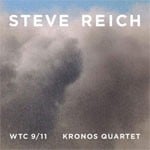This work requires additional technological components and/or amplification.
Abbreviations (PDF)
Boosey & Hawkes (Hendon Music)
In 2009 the Kronos Quartet asked me for a piece using pre-recorded voices. My first idea was to elongate the speaker's final vowels or consonants. Stop Action sound. Impossible in 1973 when I first thought of it. Possible in 2001 when 'Dolly' was begun. In this piece it was to be, and is, the means of connecting one person to another—harmonically.
I had no idea who was speaking. No subject matter. After several months I finally remembered the obvious. For 25 years we lived four blocks from the World Trade Center. On 9/11 we were in Vermont, but our son, granddaughter and daughter-in-law were all in our apartment. Our phone connection stayed open for 6 hours and our next door neighbors were finally able to drive north out of the city with their family and ours. For us, 9/11 was not a media event.
By January 2010, several months after Kronos asked me for the piece, I realized the pre-recorded voices would be from 9/11. Specifically, they would start from the Public Domain: NORAD, FDNY, and then from interviews with friends and neighbors who lived or worked in lower Manhattan.
WTC is also an abbreviation for World to Come, as my friend, the composer David Lang, pointed out. After 9/11 the bodies and parts of bodies were taken to the Medical Examiner's office on the East Side of Manhattan. In Jewish tradition there is an obligation to guard the body from the time of death until burial. The practice, called Shmira*, consists of sitting near the body and reciting Psalms or Biblical passages. The roots of the practice are, on one level, to protect the body from animals or insects, and on another, to keep the neshama (soul) company while it hovers over the body until burial. Because of the difficulties in DNA identification, this went on for seven months, 24/7. Two of the women who sat and recited Psalms are heard in the third movement. You will also hear a cellist (who has sat Shmira elsewhere) and a cantor from a major New York City synagogue sing parts of Psalms and the Torah.
WTC 9/11 is in three movements (though the tempo remains unchanged throughout):
1. 9/11
2. 2010
3. WTC
The piece begins and ends with the first violin doubling the loud warning beep (actually an F) your phone makes when it is left off the hook. In the first movement there are archive voices from NORAD air traffic controllers, alarmed that American flight 11 was off course. This was the first plane to deliberately crash into the World Trade Center. The movement then shifts to the New York City Fire Department archives of that day telling what happened on the ground.
The second movement uses recordings I made in 2010 of neighborhood residents, an officer of the Fire Department and the first ambulance driver (from Hatzalah volunteers) to arrive at the scene, remembering what happened nine years earlier.
The third and last movement uses the voices of a neighborhood resident, two volunteers who took shifts sitting near the bodies, and the cellist/singer and cantor mentioned above.
Throughout WTC 9/11 the strings double and harmonize the speech melodies and prolonged vowels or consonants of the recorded voices. You will hear a total of three string quartets, one live, and two pre-recorded. The piece can also be played by three live quartets and pre-recorded voices.
WTC 9/11 is only 15 and a half minutes long. While composing it I often tried to make it longer and each time it felt that extending its length reduced its impact. The piece wanted to be terse.
* 'Stretching a Jewish Vigil for the Sept. 11 Dead', New York Times, November 6, 2001
— Steve Reich
Reproduction Rights:
This program note may be reproduced free of charge in concert programs with a credit to the composer.
"WTC 9/11 is a masterpiece..."
— Rob Haskins, American Record Guide
"...a 9/11 work that manages to communicate the complex and often contradictory range of emotions, thoughts and feelings caused by the momentous event. A truly profound work."
— Pwyll ap Sion, Gramophone
“…a dark, raw, haunting piece, its detached fury indicative of the undiminished powers of a great American artist who will celebrate his seventy-fifth birthday in October. The beginning is singularly eerie: a sharp, gnawing dissonance in the strings, the sound of a telephone off the hook, and recorded voices of NORAD air-traffic controllers on the morning of 9/11. The ending is even eerier: after the consoling sound of a cantor singing the Wayfarer’s Prayer—‘Behold, I send an angel before you to guard you on the way and to bring you to the place that I have prepared’—the dissonance of the opening returns, and we hear a voice saying, “And there’s the world right here.” In no uncertain tones, Reich suggests that history is circular, that horror will recur.”
— Alex Ross, The New Yorker
“…[WTC 9/11] combined [Reich's] signature juxtaposition of taped and live instruments to the manipulation of the spoken word, in a sober memorial, as sad and brief as the catastrophe of Sept. 11 itself and as compact as a gravestone.”
— Anne Midgette, Washington Post
“…a restrained, taut piece in three continuous movements, almost ritualised in its plainness, and tremendously powerful in effect.”
— Andrew Clements, The Guardian
“Reich's 'additive' style of thematic development (in which new information is added to a line with each repetition) has had its share of successful moments over the last 40-plus years, though I'm hard-pressed to recall one as dead-in-your-tracks arresting as [WTC 9/11].”
— Seth Colter Walls, The Village Voice
“Reich's [WTC 9/11] crystallizes some of the anxiety and searching that characterized not just the chaos and pain of the attack and its immediate aftermath, but the great unknowns that have characterized the last decade for all of us…”
— Anastasia Tsioulcas, NPR

Kronos Quartet
Nonesuch 7559796457

